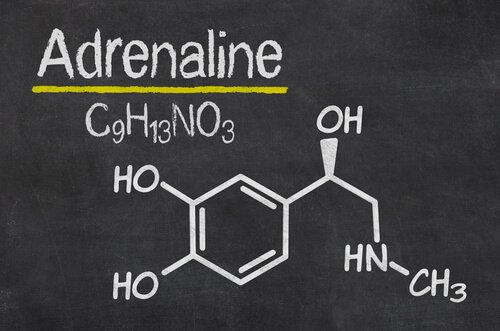The Effects of an Adrenaline Rush

An adrenaline rush occurs when your adrenal glands produce a lot of adrenaline. This rush can manifest due to stress or anxiety.
Adrenaline is an adrenergic amine. These substances stimulate the sympathetic nervous system (SNS). Specifically, adrenaline is a catecholamine. The adrenal glands produce adrenaline and, when it’s released, it can affect your entire body.
This release isn’t voluntary. Certain stimuli or specific circumstances can trigger an adrenaline rush, which can have pretty intense effects. These effects can be unpleasant and can feel similar to a panic attack.

The effects of adrenaline on your body
Adrenaline is just one element of a long metabolic chain of neurotransmitters. Neurotransmitters are your body’s messengers. They’re stored in the neurons and transmit stimuli. Adrenaline can act as a neurotransmitter, but it’s still not entirely known how adrenaline is released into the nervous system.
These are the most common effects of adrenaline:
- It makes your heart beat faster, a condition also known as tachycardia.
- It dilates your blood vessels. You look pale at first and then your skin turns red.
- At first, your breathing slows down. Then, you start breathing faster.
- It dilates your pupils.
- It alters your metabolism. Through carbs and fats, it increases blood glucose levels, which can lead to an energy boost.
- Adrenaline slows down digestion because it relaxes the digestive tract walls.
A sudden adrenaline rush can lead to anxiety, irritability, unease, and stress. The effects it has on the central nervous system seem to be secondary to the cardiovascular effects because adrenaline doesn’t reach the brain.

Adrenaline rushes aren’t random
An adrenaline rush may occur abruptly when you’re scared. If you’re under stress, it may have a continuous effect. In both cases, it excites the sympathetic nervous system and puts your entire system under a “fight-or-flight” response.
Alongside adrenaline, the adrenal gland releases corticosteroids and other catecholamines, such as noradrenaline. All of this activates your defense systems. It helps you get ready in case something happens.
An adrenaline rush can increase your blood pressure, decrease your digestive activity, and increase sweat production. At first, this is very useful because it helps you control your body movements. However, too much adrenaline can alter your coordination.
An adrenaline rush is associated with real or imaginary threats. It can occur because something scared you, someone snuck up on you all of a sudden, or maybe because the teacher just asked you to speak to the class!

Adrenaline rushes aren’t dangerous
An adrenaline rush isn’t a bad thing, but it can be frightening. However, if you’re in a stressful environment, it may have some bad side effects. It can weaken your systems and leave you in a state of chronic fatigue.
If you’re prone to adrenaline rushes, try to use meditation techniques or change your lifestyle so you can reduce their frequency and intensity. Some physiological deactivation techniques such as diaphragmatic breathing or progressive muscle relaxation can help you out a lot.
All cited sources were thoroughly reviewed by our team to ensure their quality, reliability, currency, and validity. The bibliography of this article was considered reliable and of academic or scientific accuracy.
Schmidt, K. T., & Weinshenker, D. (2014). Adrenaline Rush: The Role of Adrenergic Receptors in Stimulant-Induced Behaviors. Molecular Pharmacology. https://doi.org/10.1124/mol.113.090118
This text is provided for informational purposes only and does not replace consultation with a professional. If in doubt, consult your specialist.








